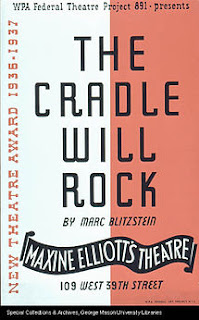A major theme in Welles’s life and career was strong male presences, men with whom he was deeply enamored. These included Dr. Maurice Bernstein (Dadda), Roger “Skipper” Hill, and John Houseman. In 1937, Welles would meet another object of near-worship, Marc Blitzstein. “When he came into the room, the lights got brighter,” Welles would later say of the Left-wing intellectual and leader of the radical Actors’ Repertory Company. Blitzstein had a labor opera named The Cradle Will Rock but not the funds to produce it. That is, until he got Welles involved. Blitzstein’s script depicted the unionization of the steel industry, a topic that was very timely. Set in Steeltown, USA, it pits the workers against the greedy Mr. Mister. The dicey political themes caused the government to order Welles not to go ahead with production. To ensure compliance, guards locked the gates of Maxine Elliot’s Theatre. The next move seemed to be to just go elsewhere. While some of the play’s pe






